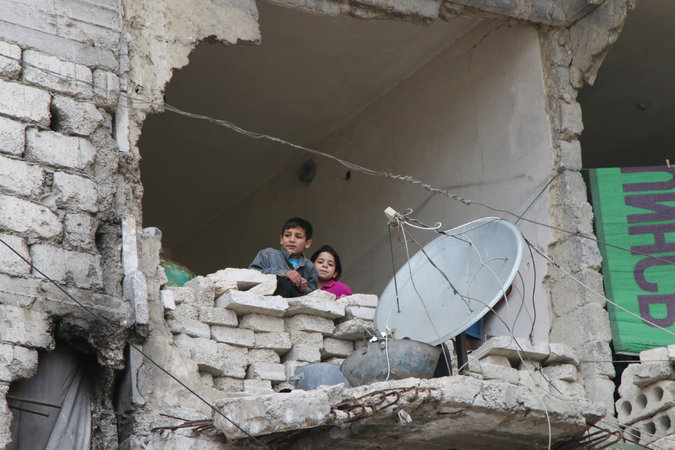Sarajevo and Aleppo, two cities once part of the Ottoman Empire, two cities whose diverse populations have included Muslims and Christians and Jews, two cities rich in culture that have been besieged and split in two and ravaged by violence, two cities where children have been victims — 20 years apart.
What a difference two decades make! Sarajevo was headline news through much of its 44-month encirclement. NATO planes patrolled the skies to prevent, at least, aerial bombardment of the population. Blue-helmeted United Nations forces were deployed in a flawed relief effort. President Bill Clinton, after long hesitation, authorized the NATO airstrikes that led to the lifting of the Serbian siege and an imperfect peace in Bosnia. Belated American intervention worked.
Aleppo lacks such urgency. It’s bombarded: What else is new? How often does the word “Aleppo” fall from President Obama’s lips (or indeed the lesson-freighted word “Sarajevo”)? At which dinner parties in London, Paris, Berlin or Washington is it discussed? Which Western journalists are able to be there to chronicle day after day their outrage at a city’s dismemberment? Who recalls that just six years ago Aleppo was being talked about in Europe as the new Marrakesh, a place to buy a vacation home?
Aleppo is alone, alone beneath the bombs of Russian and Syrian jets, alone to face the violent whims of President Vladimir Putin and Bashar al-Assad.
Oh, yes, I know, when the photograph of a child like Omran Daqneesh is seen, as it was this month, covered in blood after being dug from the rubble of Aleppo, the image may go viral just long enough for people to lament the Syrian debacle. Lament and forget. There’s Donald Trump to think about. Forget the more than 400,000 dead, the more than 4.8 million refugees, and the destruction of a city like Aleppo that is an expression of millennia of civilization.
Daqneesh, whose brother Ali was killed, is this year’s Alan Kurdi, the dead Syrian child washed up on a Turkish beach who prompted another ephemeral spasm of outrage last September.
Today, as then, Aleppo is divided between a beleaguered eastern sector controlled by opposition groups and a larger western sector controlled by Assad’s brutal regime. The “cessation of hostilities” of last February has predictably collapsed. Russia, which moved into Syria last year when it realized that — come what may — Obama would sit this war out, leads the United States in a grotesque diplomatic pas de deux going nowhere.
American power has lost credibility in the past two decades. From Ukraine to Syria, Russia dictates events with impunity. The optimism, perhaps naïve, about a perfectible world that led to the endorsement by all United Nations member states in 2005 of the Responsibility to Protect — a commitment to prevent genocide, war crimes and ethnic cleansing — has died. R2P (its acronym) seems quaint, a wasted effort in a bygone world. ISIS and jihadi terrorism have curtailed Western journalists. Attention spans have shrunk as connectivity has accelerated.
These are some of the changes on the road from Sarajevo to Aleppo. They have produced a more dangerous, pessimistic world.
Obama has said the Libyan intervention was his worst mistake. He has said he is “very proud of this moment” in 2013 when he decided to resist “immediate pressures” and not uphold with military force his own “red line” against the use of chemical weapons in Syria.
No, Syria has been Obama’s worst mistake, a disaster that cannot provoke any trace of pride; and within that overall blunder the worst error was the last-minute “red line” wobble that undermined America’s word, emboldened Putin and empowered Assad.
As Obama said on Aug. 31, 2013, in announcing his decision to delay military action and seek authorization for the use of force from Congress: “What is the point of the international system” if the chemical weapons ban can be flouted? He also said, “What message will we send if a dictator can gas hundreds of children to death in plain sight and pay no price?”
The answer is now clear: The dictator Assad will slaughter many more children. The international system undergirding global peace will become weaker.
Obama did not in fact say in the Rose Garden three years ago that he had rejected force; he urged Congress to get behind it. With time these events have blurred to make him “very proud of this moment.”
No outcome in Syria could be worse than the current one. Assad’s bomb-spewing jets and his airfields should have been taken out early in the war, before ISIS. The red line should have stood. The consequences for the European allies of Obama’s let-Syria-fester policy have been overwhelming.
Watch the shattering video by Britain’s Channel 4 about the florist of Aleppo, the brave man who kept the city’s last flower store open, and weep. Understand that desperate people still beautify streets with flowers to assert life over death. The flower-seller is dead, his son’s terrible anguish that of a whole city.
Aleppo, symbol of failure, symbol of indifference, symbol of American retreat, should not have been left to bleed.
The New York Times
